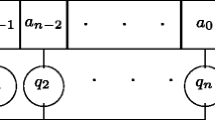Abstract
Cryptographic sequence generators are discussed in which a linear feedback shift register (LFSR) is clock controlled in a pseudorandom manner by another register. A model of clock-controlled sequences is proposed. The necessary and sufficient condition guaranteeing the maximal linear complexity and the maximal period of such sequences is given. Two kinds of improved models having better statistical properties are given. In order to study the security of this model, three types of algebraic attacking algorithms are proposed. If the length of the second LFSR in such a model is large, the model can resist our algebraic attacks.
Similar content being viewed by others
Explore related subjects
Discover the latest articles, news and stories from top researchers in related subjects.References
Beth, T., Piper, F. C.: The stop-and-go generator. Advances in cryptology: Proceeding of Eurocrypt'84. Lecture Notes Comput. Sci.209, 88–92 (1985)
Chambers, W. G.: Clock-controlled shift registers in binary sequence generators. IEE Proceedings, Pt.E,135 (1), 17–24 (1988)
Chambers, W. G., Jennings, S. M.: Linear equivalence of certain BRM shift register sequences. Electron. Lett.20, 1018–1019 (1984)
Golić, J. D., Zivković, M. V.: On the linear complexity of nonuniformly decimated PN-sequence. IEEE Trans.IT-34, 1077–1079 (1988)
Gollmann, D.: Pseudo random properties of cascades connections of clock controlled shift registers. Advances in cryptology: Proceedings of Eurocrypt'84. Lecture Notes Comput. Sci.209, 93–98 (1985)
Hua Luogeng: Introduction to number theory. Beijing: Scientific Publishing House 1979
Kjeldsen, K., Anderesen, E.: Some randomness properties of cascaded sequences. IEEE Trans.IT-26, 227–232 (1980)
Lidl, R., Niederreiter, H.: Finite fields. London, Amsterdam: Addison-Wesley 1983
Liu Xian, Xiao Guozhen: Linear complexity of a type of clock-controlled sequence. Electron. Lett.28, 709–710 (1992)
Ruppel, R. A.: Analysis and design of stream ciphers. Berlin, Heidelberg, New York: Springer 1986
Rueppel, R. A., Staffelbach, O. J.: Products of linear recurring sequences with maximal complexity. IEEE Trans.IT-33, 124–131 (1987).
Siegenthaler, T.: Correlation immunity of nonlinear combining functions for cryptographic applications. IEEE Trans.IT-30, 776–780 (1984)
Smeets, B.: A note on sequences generated by clock controlled shift registers. Advances in cryptology: Proceedings of Eurocrypt' 85. Lecture Notes Comput. Sci.219, 142–148 (1986)
Surbock, F., Weinrichter, H.: Interlacing properties of shift-register sequences with generator polynomials irreducible over GF(p). IEEE Trans.IT-30, 386–389 (1987)
Vogel, R.: On the linear complexity of cascaded sequences. Advances in cryptology: Proceedings of Eurocrypt'84. Lecture Notes Comput. Sci.209, 99–109 (1985)
Wan Zhexian: Algebra and coding. Beijing: Scientific Publishing House 1985
Author information
Authors and Affiliations
Rights and permissions
About this article
Cite this article
Xian, L., Guozhen, X. Analysis of (k 0 ,k 1 ) clock-controlled sequences. AAECC 6, 159–169 (1995). https://doi.org/10.1007/BF01195334
Received:
Revised:
Issue Date:
DOI: https://doi.org/10.1007/BF01195334




